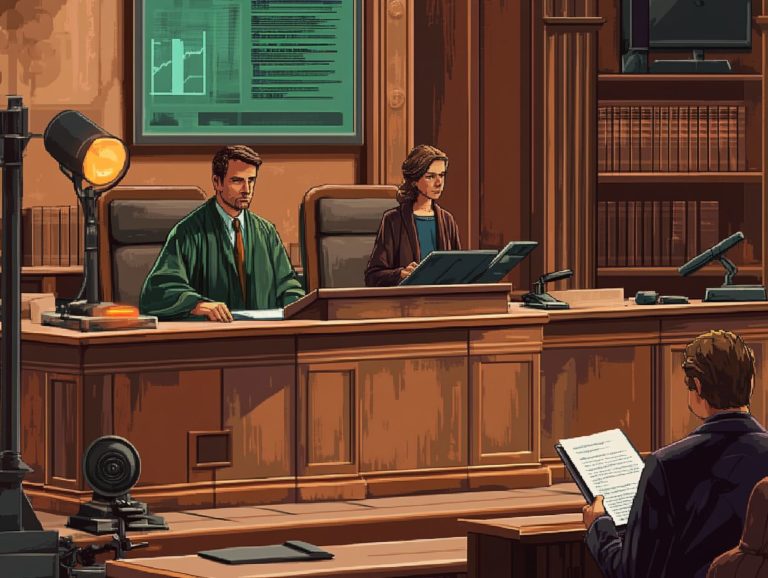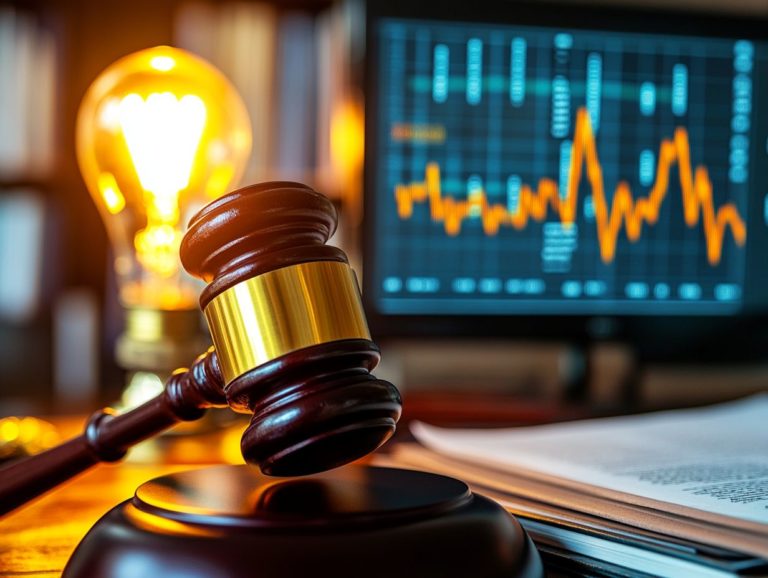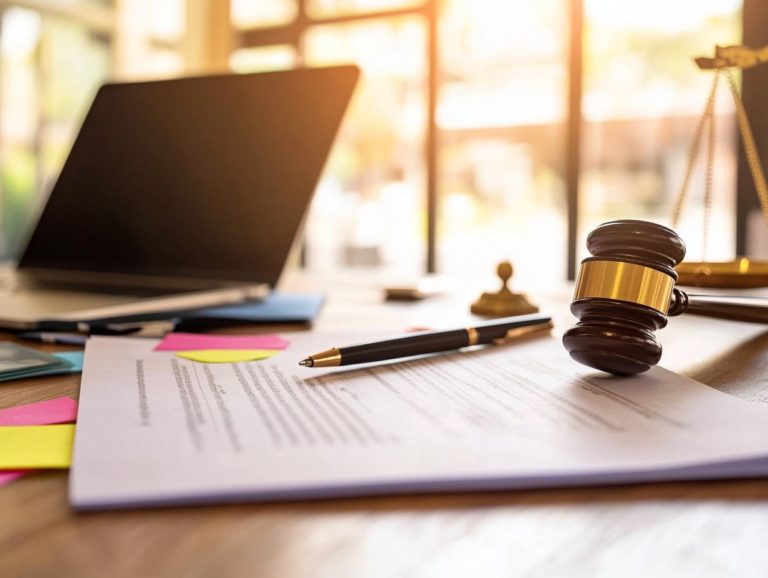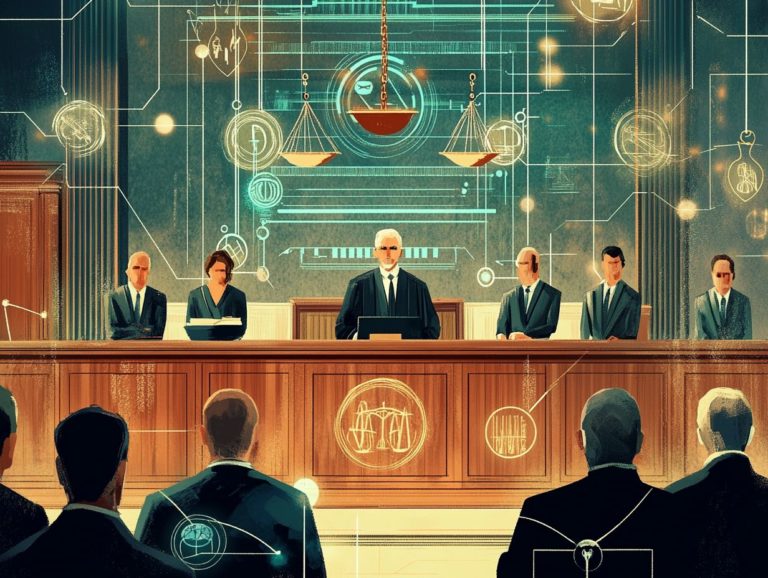Exploring IP Litigation Outcomes and Remedies
Intellectual Property (IP) litigation plays a crucial role in protecting your creative work in today s fiercely competitive landscape.
Navigating this complex field is essential for anyone dealing with legal disputes regarding patents, trademarks, and copyrights. This article will break down the various types of IP litigation and explore the potential outcomes you might encounter from winning a case to reaching settlement agreements.
We will highlight the key factors that can influence the results of these legal battles. Join us as we explore the exciting world of IP litigation, equipping you with the knowledge to better understand this critical area of law.
Contents
Key Takeaways:
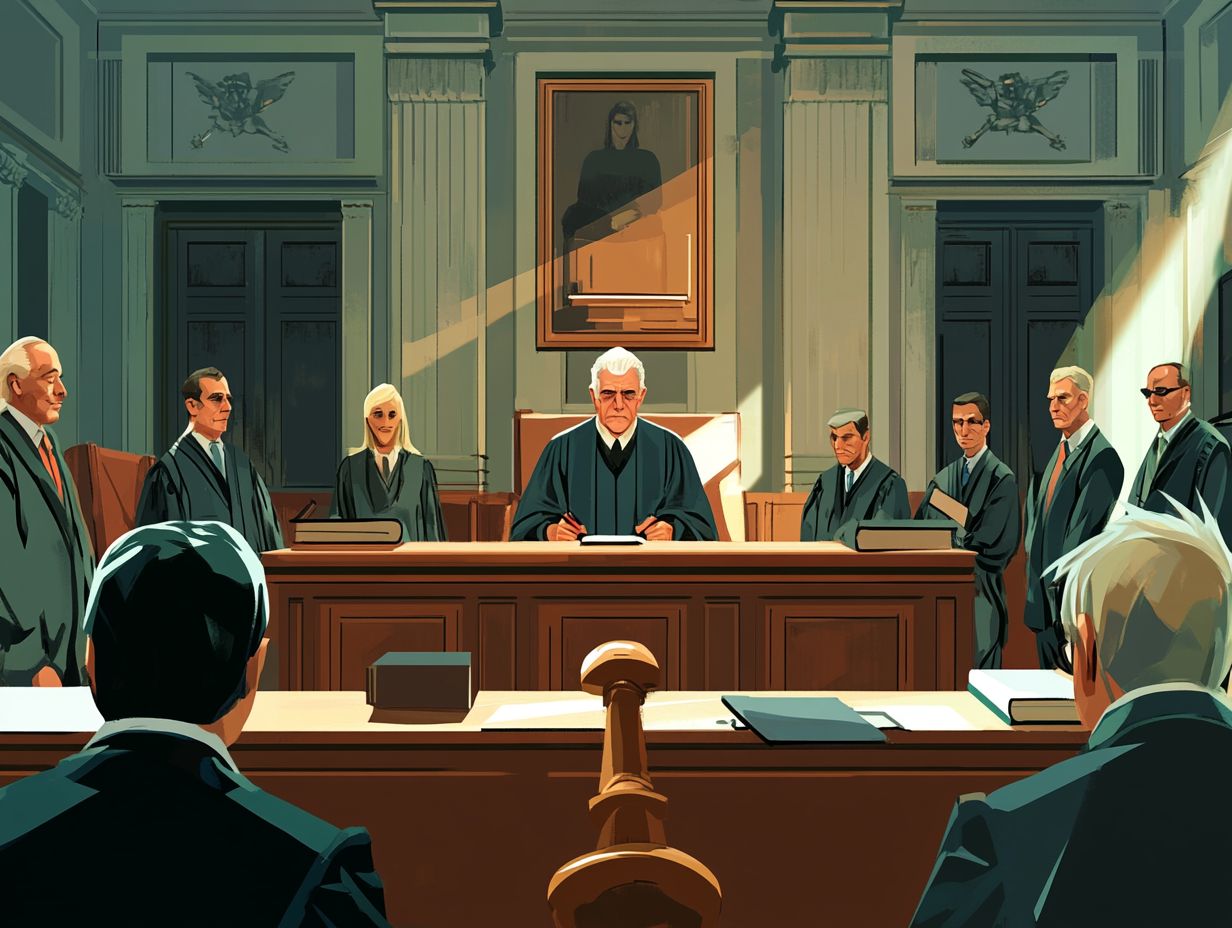
IP litigation involves legal disputes over intellectual property rights, such as patents, trademarks, and copyrights.
Common outcomes include winning a case or reaching a settlement agreement.
Expect remedies like injunctions (court orders to prevent actions), damages (financial compensation for losses), and royalties.
Factors like the strength of evidence and legal representation can influence outcomes.
Understanding IP Litigation
Understanding IP litigation is crucial for you as a creator or business owner seeking to safeguard your intellectual property rights. These rights cover a spectrum of protections, including patents, copyrights, trademarks, and trade secrets.
This legal arena deals not only with actions surrounding alleged IP infringement but also plays a vital role in fostering innovation and driving economic growth.
Engaging in IP litigation means defending your exclusive rights against competitors and navigating the complex legal landscape. To do this effectively, it’s crucial to understand how to track IP litigation trends to secure damages or settlement agreements.
Moreover, the outcomes of your IP litigation efforts can significantly impact entire market sectors and influence consumer awareness in important ways, highlighting the role of data in IP litigation decisions.
What is IP Litigation?
IP litigation encompasses the legal process used to resolve disputes surrounding intellectual property rights, including lawsuits that arise from alleged infringements of patents, trademarks, copyrights, and trade secrets.
You may encounter these disputes in various contexts, from business competitions to creative works and technological innovations, making the realm of intellectual property incredibly intricate.
The legal system plays an essential role in adjudicating these cases, providing a structured environment where you can present evidence and argue your position.
Common outcomes often include monetary damages awarded to the prevailing party, designed to compensate for losses stemming from infringement. Additionally, you might see injunctive relief, which can prevent further violations, highlighting the importance of IP education in litigation.
Ultimately, the resolution of these disputes not only impacts the parties involved but also helps establish legal precedents and maintain the integrity of intellectual property laws.
Types of IP Litigation
IP litigation encompasses a range of specialized areas, each addressing different facets of intellectual property rights.
You have:
- Patent litigation, which safeguards inventions;
- Copyright litigation, focused on protecting creative works;
- Trademark litigation, aimed at defending brand identity;
- Trade secret litigation, which secures confidential business information.
Each type serves a unique purpose, providing essential legal protections for creators and businesses alike.
If you want to learn more about protecting your intellectual property rights, consider seeking legal advice.
Patent Litigation
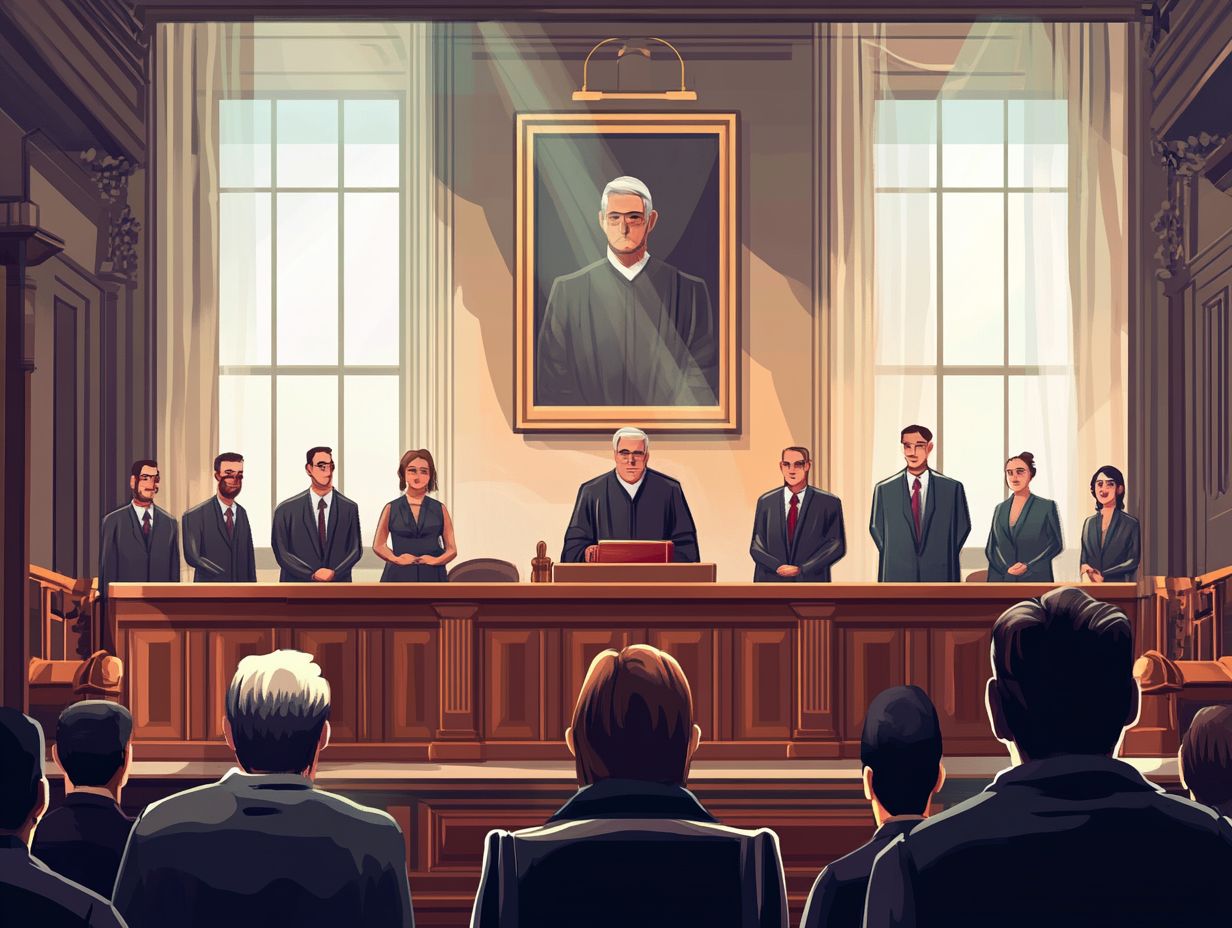
Patent litigation involves disputes over the infringement of patent rights, typically navigated within federal courts. To succeed in this realm, you need a thorough understanding of the litigation process and the legal authority of the United States Patent and Trademark Office (USPTO).
This intricate landscape includes a diverse array of stakeholders: inventors, corporations, and legal representatives engaged in intense battles over unauthorized use of patented inventions. The USPTO plays a crucial role by granting patents and upholding intellectual property law.
Outcomes of such litigation can vary widely. They may include monetary damages awarded to the patent holder or injunctive relief that prevents the infringing party from further use of the patent.
The implications of these confrontations can profoundly influence the exclusive rights of the patent owner, shaping their ability to profit from their innovations.
Trademark Litigation
Trademark litigation revolves around enforcing trademark rights, covering disputes over both registered and unregistered trademarks. It addresses matters of intellectual property infringement and potential damages.
This legal process is essential for protecting your brand identity and maintaining consumer trust. It ensures you can effectively safeguard your intellectual property.
The distinction between registered and unregistered trademarks is pivotal in these disputes. Registered trademarks enjoy a presumption of validity and broader legal protections. Conversely, unregistered trademarks can still hold value under common law but face a heavier burden of proof.
When courts assess potential infringement, they focus on the likelihood of consumer confusion. This likelihood depends on factors like the similarity of marks and the nature of the goods or services offered.
Potential legal outcomes can range from monetary damages to injunctions that prohibit further unauthorized use. It is crucial for you to understand your rights and obligations in this complex landscape.
Copyright Litigation
Copyright litigation addresses disputes surrounding the protection of creative works. It allows you, as an author or creator, to seek legal remedies for unauthorized use or infringement of your copyrights. This process helps safeguard your original expressions, including literature, music, digital media, and visual arts.
When your work is used without permission, it undermines your financial interests and the intrinsic value of originality in a competitive marketplace. Common copyright cases often involve issues like plagiarism or unauthorized reproduction, raising critical questions about fair use and acceptable copying limits.
As we navigate the ever-evolving digital age, understanding the legal protections available to you is increasingly essential. This knowledge is vital for defending your creative rights and fostering an environment that nurtures innovation and artistic expression.
Possible Outcomes of IP Litigation
The outcomes of IP litigation can be quite varied, presenting a range of possibilities. You might win a case, negotiate settlement agreements, receive damages, or face injunctions impacting your future business operations. For a deeper understanding, explore the global landscape of IP litigation today.
Each scenario carries its own implications, making it essential to navigate the process with careful consideration.
Winning a Case
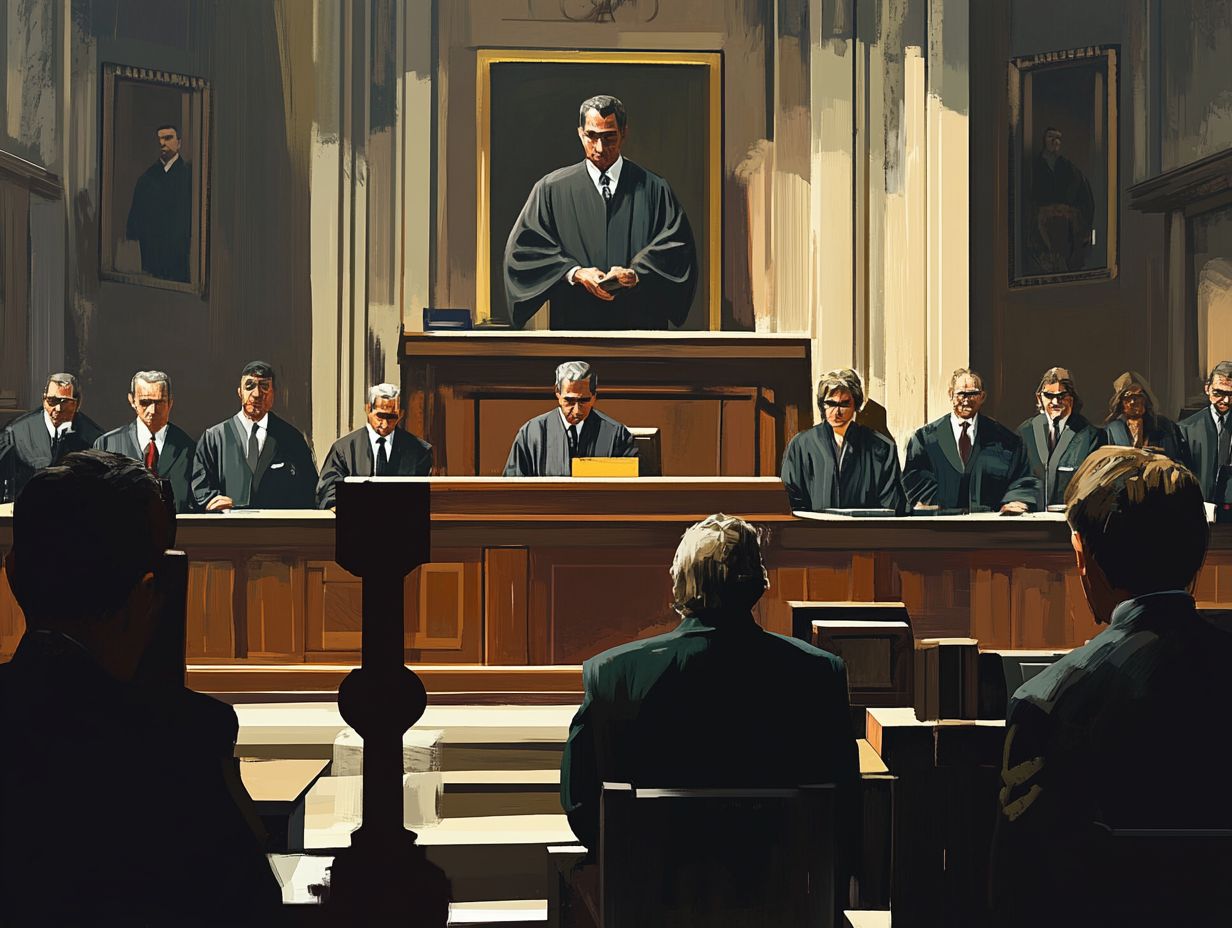
Winning a case in IP litigation demands a keen understanding of legal arguments, solid evidence, and the ability to convince a judge or jury about the legitimacy of your exclusive rights.
This journey starts with clearly defining your intellectual property rights and being aware of relevant laws and precedents that could influence the outcome.
You must come prepared with meticulously documented evidence, whether it be trademarks, patents, or copyrights, to support your claims.
The power of persuasive legal arguments is paramount. It s essential to articulate how the infringement occurred and its repercussions on your market position. Enlisting expert witnesses to testify about the intricacies of the technology or creative work at the center of the dispute can significantly strengthen your case.
Settlement Agreements
Settlement agreements in IP litigation offer a savvy alternative to lengthy court battles. They often involve negotiations addressing legal fees, damages, and confidentiality clauses to safeguard your proprietary information.
The process typically begins with both parties evaluating their strengths and weaknesses. This gives a clearer picture of the possible outcomes of litigation.
By stepping into negotiations, you can explore terms that might include licensing agreements, payment plans, or even ongoing collaborations. All of these are designed to create a win-win scenario.
One of the key benefits of reaching a settlement is the speed at which you can achieve a resolution. This is especially notable when compared to long court battles that can stretch on for months or even years.
But don t forget to consider the potential downsides. Compromising certain rights or grappling with a sense of unresolved conflict might linger, even after an agreement is reached.
Remedies Available in IP Litigation
In IP litigation, you have access to a range of remedies designed to protect your interests, including insights into the influence of technology on IP litigation outcomes. These include:
- Injunctions to halt any further infringement,
- Monetary damages to compensate for your losses, and
- Potential royalties for the unauthorized use of your intellectual property.
Each option offers a strategic avenue to assert your rights and seek justice for any violations.
Injunctions
Injunctions are court orders that stop someone from doing something. They act as a formidable remedy in IP litigation, effectively prohibiting further infringement.
These legal instruments are vital for protecting intellectual property, offering immediate relief to the aggrieved party and minimizing potential damage while the case is assessed.
They serve to halt ongoing violations that could disrupt the competitive landscape and the operational stability of your business.
Securing an injunction sends a potent message to the market about the gravity of enforcing IP rights, deterring future infringements.
Companies typically rely on these judicial orders to shield their innovations, ensuring that their investments in research and development remain both profitable and secure from unauthorized exploitation.
Damages
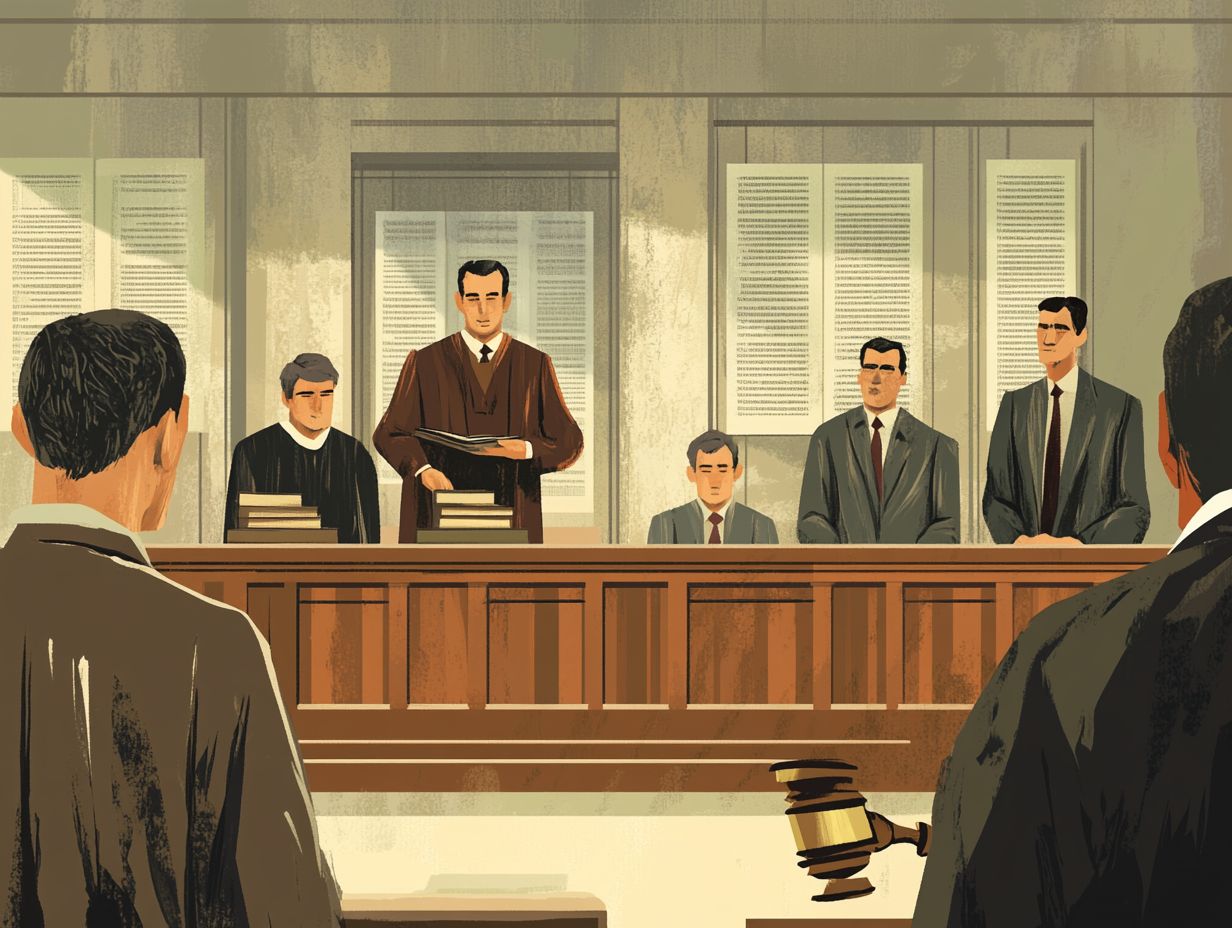
Damages awarded in IP litigation can vary significantly. They may include statutory damages, actual damages, and lost profits, especially in cases involving patents and copyrights.
These damages are assessed based on criteria such as the nature of the infringement, the extent of its market impact, and the intent of the defendant.
For example, statutory damages set by law can be awarded even without evidence of actual loss, providing plaintiffs with a powerful advantage.
On the flip side, defendants must deal with the serious implications of hefty damage awards, which can impose substantial financial burdens that hinder their market position and future operations.
Understanding these intricacies is essential for both parties as they navigate the complex realm of intellectual property rights. This understanding ultimately shapes their legal strategies and business decisions.
Royalties
Royalties often play a pivotal role in settlement agreements within IP litigation. They serve as compensation for IP rights holders whose intellectual property has been used without authorization.
This mechanism addresses the financial repercussions of infringement and paves the way for future licensing arrangements.
Royalties do more than just remedy the past; they help define the terms for how intellectual property is valued and utilized moving forward.
By establishing a clear framework, royalties ensure that both parties commit to agreements that protect valuable trade secrets.
The strategic application of royalties in these disputes encourages negotiation, facilitating a more amicable resolution.
Ultimately, this fosters an environment where both creators and businesses can flourish, free from the anxiety of losing their competitive advantage.
Factors Affecting IP Litigation Outcomes
Numerous factors influence the outcomes of IP litigation. These include the strength of the evidence you present, the caliber of your legal representation, and the jurisdiction and venue where your case is filed, especially considering the future of IP litigation in a digital age.
Each element plays a critical role in shaping the trajectory of your litigation journey.
If you find yourself involved in IP disputes, consider seeking legal advice or exploring settlement options to navigate this complex landscape effectively.
Strength of Evidence
The strength of evidence plays a key role in your IP lawsuits. It shapes the arguments you present to the judge or jury and influences the outcome of your case.
Strong evidence boosts your chances of success. This can include documents, witness testimony, and expert opinions that establish the legitimacy of your claims.
A well-crafted case, backed by strong evidence, clarifies the facts and can sway decision-makers in your favor. This makes effective use of evidence essential for a persuasive argument.
Legal Representation
Great legal representation can make all the difference in your IP lawsuit! An experienced legal team has the expertise to navigate complex legal issues and maximize potential damages.
By hiring knowledgeable attorneys, you gain their understanding of IP laws and precedents. This is crucial for crafting strong arguments and negotiating better settlements.
Their ability to analyze your case often determines the viability of your claims. This influences the overall strategy used during the lawsuit.
Skilled lawyers help you avoid common pitfalls and ensure your case progresses smoothly. They assess the strengths and weaknesses of the other party’s arguments, allowing you to make informed decisions.
Their presence can significantly influence both the timeline and the final outcome of your dispute.
Jurisdiction and Venue
Jurisdiction and venue are critical in IP lawsuits. They determine where to file your case and which court has the authority to hear it.
The choice of jurisdiction can greatly affect both parties. It impacts the laws that apply and the tone of the legal proceedings.
For plaintiffs, a venue known for favoring IP claims can improve the chances of a favorable verdict. Defendants may try to challenge jurisdiction to move the case to a more favorable location.
Understanding jurisdiction and venue is vital. These choices directly influence the dynamics of your IP dispute and the stakes involved.
Here are some tips for individuals and businesses involved in IP lawsuits. Conduct thorough research on your IP rights, gather strong evidence for your case, and seek professional legal advice.
It’s important to communicate and negotiate with the other party in good faith. Reaching a settlement can often be more efficient and cost-effective than going to court.


